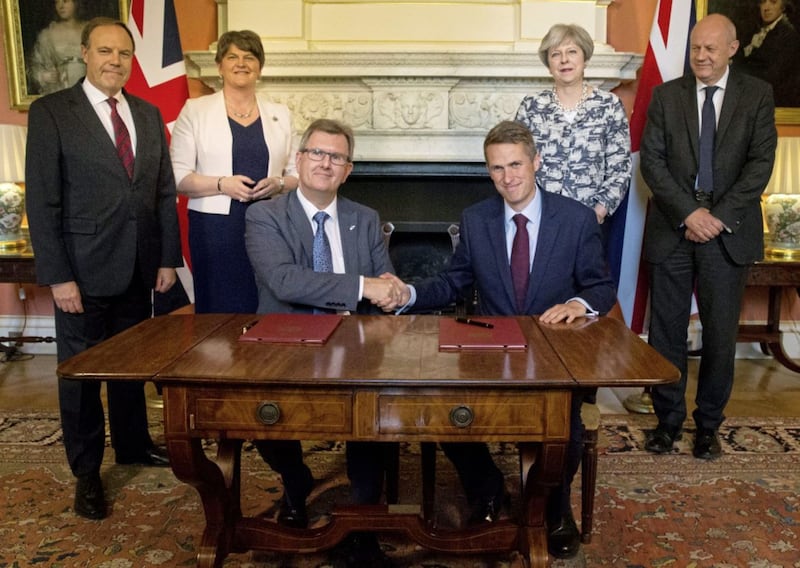In the south, Leo Varadkar will be remembered for the 2018 abortion referendum and for his handling of the Covid pandemic, as well as for the historic rapprochement with the old civil war enemy, Fianna Fáil, in 2020.
In the north, however, nationalists will remember him for his successful handling of the Brexit negotiations.
On the unionist side of the coin, a remark of Donald Tusk is appropriate. Tusk said there is “a special place in hell for those who promoted Brexit without even a sketch of a plan how to carry it out”.
That applies to the DUP, but unionists would reverse the comment and reserve a special place in hell for Varadkar, who prevented them achieving their main objective in supporting Brexit: a hard British border in Ireland and potentially fatal damage to the Good Friday Agreement.

Varadkar succeeded Enda Kenny in June 2017, just as serious Brexit negotiations were about to begin. Kenny and his Labour partners largely neglected the north, which to them seemed stable since 2010. Besides, Eamon Gilmore, foreign affairs minister and former Workers Party stalwart, was hostile to Sinn Féin.
However, Varadkar took a different line. In December 2017 he thought he and the EU had secured a deal with the UK. Varadkar said: “To the nationalist people in Northern Ireland, I want to assure you that we have protected your interests throughout these negotiations. Your birth right as Irish citizens, and therefore as EU citizens, will be protected. There will be no hard border on our island. You will never again be left behind by an Irish Government. These rights will, of course, be available to everyone in Northern Ireland who chooses to exercise his or her right to be an Irish citizen, regardless of their political persuasion or religious beliefs.”
- Brian Feeney: Leo Varadkar and Micheál Martin show little real understanding of northOpens in new window
- Patrick Murphy: Unless nationalists start trying to understand unionism, Leo Varadkar will have to live forever if there's to be a united IrelandOpens in new window
- Leo Varadkar says border poll would be defeated and take united Ireland off agenda 'for a long period of time'Opens in new window
Under pressure from the DUP, whose votes they depended on, the British ratted on the deal.
Unionists took serious exception to Varadkar’s perceived arrogant, republican tone. It was the beginning of a fraught relationship with unionists, which would deteriorate rapidly over the next three years.
On the other hand nationalists immediately responded to Varadkar’s remarks, hundreds signing a public letter appealing to the taoiseach to protect their rights. Another letter, organised by the newly-established civic group Ireland’s Future and signed by 1,000 prominent nationalists, soon followed.

They had deep concern about the Conservative government’s dependence on the DUP after signing a confidence and supply agreement which John Major correctly said breached the Good Friday Agreement. It was that pact which wrecked the deal in December 2017.
Unionists would reserve a special place in hell for Varadkar, who prevented them achieving their main objective in supporting Brexit: a hard British border in Ireland and potentially fatal damage to the Good Friday Agreement
Over the following three years, however, Varadkar held the line. He avoided a British border in Ireland and not only secured EU rights for northerners of all persuasions but retained EU law in the north, such as the critically important EU Charter of Fundamental Rights and free trade on the island to advance the all-island economy. By 2020 he had become a hate figure for loyalists, his image adorning murals in unionist districts.

People have remarked how green Fine Gael became in Varadkar’s time but there was a method in his actions. He was stealing Fianna Fáil’s clothes. As Micheál Martin turned apostate on reunification to distance FF from Sinn Féin, Varadkar presented Fine Gael as the main opponent of Sinn Féin in the next election, ruling out any coalition. FF lost its way, Martin terrified of being gobbled up by SF in a coalition.
For northern nationalists Brexit was Varadkar’s finest hour, but voters in the south didn’t care. In the 2020 election he lost 15 seats and slumped to third largest party. That’s politics.




